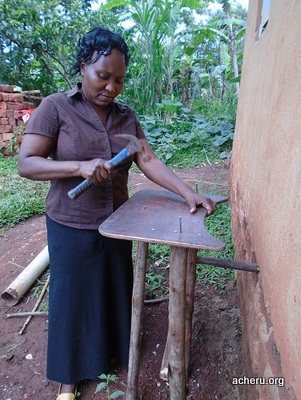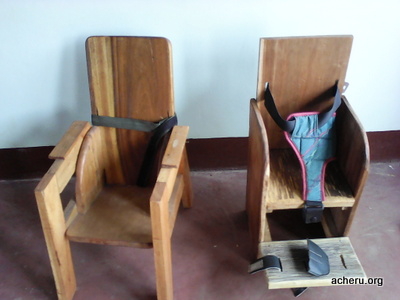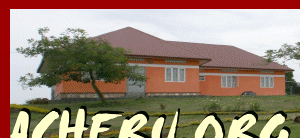|
|
| June
2016 report |
| There is more to the work of Acheru than the case histories for surgical patients we've been putting on the website. There is advocacy for the disabled using various means including radio broadcasts and promotion of Acheru through churches and schools. Rose, our social worker, helps in preparing background reports, meeting with children and their families, preparing the way for Acheru treatment, and following up on discharged patients. Harriet leads the work of community based rehabilitation, looking at the care of disabled children in the community and through this work also identifying and assessing children who might benefit from treatment in Acheru. |
| There's more to it than advice and counselling as Harriet can also provide practical help with disability aids such as crutches, walking aids, or CP chairs. Previously some of these things had to be bought but the Acheru workshop is now in use with Harriet, assisted by Sam Mutumba, producing things there. At present they are working mainly with wood, but hope soon to have metalwork facilities enabling them, for example, to repair wheelchairs. |


|
| Harriet before we built the workshop (left), and CP chairs now produced in workshop (right) |
| We constantly try to monitor and evaluate what Acheru is doing. Our work in northern Uganda was intended to be temporary, but it is hard to look at cost effectiveness and efficiency because of the practicalities of working over such a wide area. Relatively small numbers are treated, but for those we do reach it can be life changing. Other medical services are developing in the north but indications are there is still a big need for Acheru. Osteomyelitis is common, often a result of neglected injuries, poor hygiene and untreated wounds. Surgery may be straightforward but the infection can take a long time to treat and a number of children relapse. They are treated with antibiotics but the problems are made much worse by the distances they may need to travel to get to one of our clinics. I believe that the numbers we see are representative of a much bigger problem. I have looked back over Acheru records. Approximately one quarter of Acheru inpatients at Kabembe, most of whom will have had operations, are from the north. These are in addition to children who can be treated locally, at rural clinics or at our small Minakulu outpatient unit. |
| The work is conducted with a very modest budget, we have to ensure that work in the north doesn't divert resources away from our main site at Kabembe. Many children still need treatment but we believe Acheru is now the right size bearing in mind needs, resources, and staffing. Any attempt to make the work bigger could lead to overreaching ourselves and putting all the work at risk. We need to look at how our work fits in with other medical services and remain focused on what we can do best. |
|
|
|





